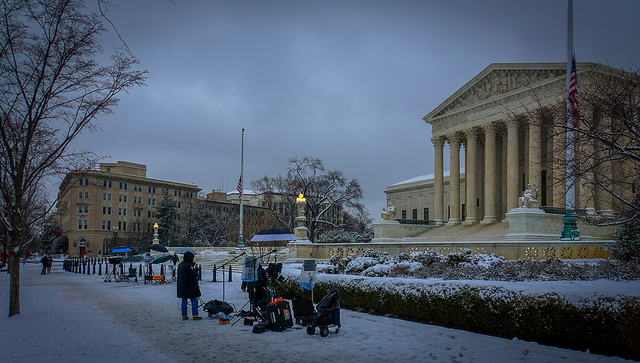
As President Obama enters the last year of his presidency, his legacy begins to come into focus. He made some big promises to move immigration reform forward, but he’s had trouble delivering. His efforts in exercising his executive powers to move the clock forward have brought limited results.
Throughout Obama’s presidency, deportation numbers have been at record highs. Thousands of families were broken apart, and thousands of U.S. citizen children were traumatized by the deportation of one or both of their parents. At the same time, Obama managed to launch the DACA program, which helped over two million young people get temporary permission to remain in the country while working or attending school. But his efforts to expand DACA and to institute the DAPA program, which would help the parents of U.S. citizen and lawful permanent resident (LPR) children was successfully halted by a lawsuit filed with a federal judge in Texas.
The appeal’s fate will likely be decided by the Supreme Court this summer, but even if the president is to prevail, time is still not on his side – his term ends in January 2017, leaving a small window for the implementation of DAPA.

Things took another dramatic turn last week, with the unexpected death of Justice Antonin Scalia, which caused a momentous upheaval in our political and legal system and may take many months for all repercussions to work out.
Republican Senators have made it clear that they refuse to even consider a nominee put forth by President Obama, and as such, it is not clear if there will be a ninth justice taking Scalia’s seat on the Supreme Court. As a result, if the GOP is successful in hamstringing Obama’s efforts to fulfill his constitutional duty to expediently fill the vacant Supreme Court seat, then the cases currently on the court’s docket will be decided by a truncated panel of justices.
An eight-justice SCOTUS gives rise to four possible outcomes for the pending DAPA case. First, the court could split equally in a four-four decision, which would mean the lower court’s ruling would stand and the DAPA program would officially be over — before it even had a chance to start. Another possibility is that the court will vote to hear the case later once a ninth justice is seated — yet another delay in the prospective implementation of DAPA. In this case, the fate of DAPA would probably be decided by the candidate who wins the November 2016 presidential election.
The third and fourth possibilities are that the case will be decided on time by eight justices with a majority either upholding the lower court’s decision, or overturning it, supporting the Obama appeal. Of the four possibilities, only the last would mean that DAPA has a chance of going forward this fall. Even in this best case scenario, however, all DAPA progress could be dismantled by a newly-elected GOP President committed to campaign promises of undoing the work done via Obama’s executive orders.
It is ironic and unfortunate that Justice Scalia’s death may have lowered the chances of DAPA going forward this year rather than enhancing it; paradoxically, his absence from the court may damage DAPA’s chances more than his historically conservative interpretation of the law.

The Future of Immigration
From the point of view of an immigration practitioner, one must translate this state of affairs at the intersection of national politics and the everyday trials and tribulations of ordinary people, who turn to us for counsel and assistance. Our dysfunctional immigration system is not only causing needless suffering for many families in this country, it is also clouding the future of many American lives and holding back the country’s forward march toward progress.
There is little prospect for significant change in 2016 even though recent polls indicate that a substantial majority of Americans support a legal path to citizenship for 11 million undocumented residents. In the unlikely event that DAPA does go forward with a favorable decision from the Supreme Court this year, the uncertainties connected with the November 2016 presidential election loom large.
In the meantime, local ICE agents are often caught sabotaging the spirit of the president’s immigration policies. They continue to deport people with no criminal records; people who have children and spouses here and who are DAPA eligible, meaning they could avoid removal if the president’s intended executive actions eventually go forward.
It is clear that the status quo is not sustainable. Sooner or later, immigration reform will become an economic necessity, not just a campaign talking point. In the meantime, however, the gears of our dysfunctional, and often mean-spirited, system keep turning, causing displacement, trauma and suffering on the part of immigrant families. It damages our communities, our economy, and our reputation as a nation of immigrants, where the future of the global world is created.
With civil wars raging worldwide, turmoil in the Middle East and Africa, and systemic corruption and violence plaguing much of Latin America, refugees are on the move in search of shelter from the storm, a life without constant fear, and a better future for their children. Millions of displaced people have nowhere to go, but they keep knocking on the doors of Europe and the United States for a chance at a normal life. Germany has opened its doors to over one million refugees in 2015, while the U.S., sheltered by the distance, has taken in a paltry few thousands. American policies are progressively harkening back to the 1930s, when the clouds of war and persecution were brewing in Europe, and America closed its doors to those desperately seeking shelter and protection. It seems we have learned little and history is on the verge of repeating itself.
